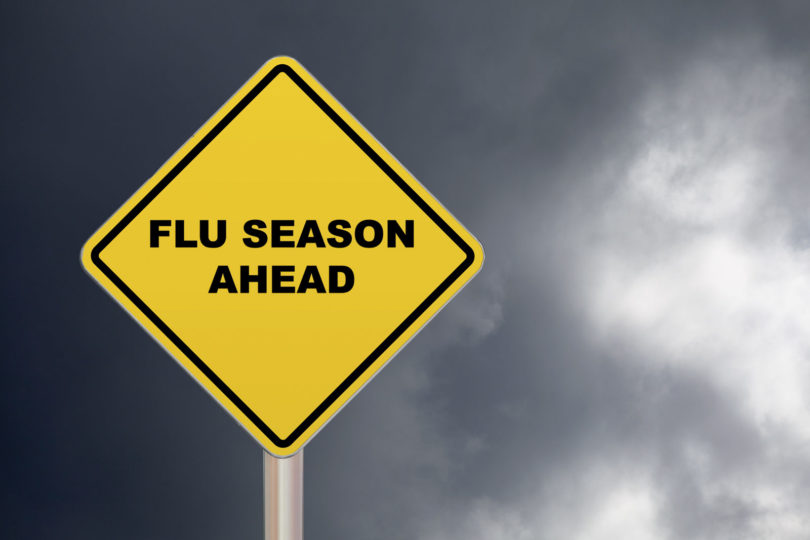Over the years, misconceptions about the influenza vaccine have arisen and spread, with much of the confusion caused by the ever-changing nature of the influenza viruses themselves.
Influenza — more commonly referred to as the flu — is a contagious respiratory disease that affects millions of Americans every year. Common symptoms of the flu include body aches, fever, cough, sore throat, fatigue and sometimes vomiting and diarrhea. Just as the flu affects people differently, the symptoms and severity vary from person to person.
In the worst cases, the flu can lead to hospitalization and even death.
Anyone can catch the flu, even healthy adults and children; however, those who are under the age of five, are over the age of 65, are pregnant or have compromised immune systems are among those most susceptible to the flu and flu-related complications, according to the Centers for Disease Control and Prevention (CDC).
Due to the increased susceptibility and risk factors, “it is important that not only those groups who are vulnerable be vaccinated, but for those around them to consider vaccination to help prevent the viruses’ spread,” says Dr. Steven Leblang, medical director of Tidewater Physicians Multispecialty Group (TPMG).
Overall, the flu vaccine is intended to protect the public — especially those who are most vulnerable to the flu, as well as those who may not be able to get the vaccine. While the vaccine does not provide protection from all flu virus strains, the CDC does recommend the vaccine for nearly everyone six months of age and older as the best protection method.
“Can you get the flu from the flu shot?”
It is not possible to get the flu from the flu vaccine, according to the CDC. If a vaccine recipient gets sick with the flu despite being vaccinated, there are various potential explanations — such as exposure to a flu virus strain not included in the vaccine or a strain in the vaccine that has changed or mutated.
There are associated side effects of the flu vaccine, but typically, they do not last very long, Leblang says. “People who get the flu shot may experience side effects of the vaccine, such as a low-grade fever, soreness at the injection site and aches,” he says.
“I’ve never gotten the flu, so why should I get the vaccine?”
Someone who has never had the flu may feel as though they have built up natural immunity over time. But it doesn’t really work that way. Since every flu season is different, and because virus strains change from year to year, having the flu — or being exposed to it — in the past does not guarantee protection in the future.
To account for the continuous change in the virus strains, the World Health Organization (WHO) and its global partners, including the CDC, conduct continuous monitoring of the influenza viruses around the world. Based on that data, the WHO makes a recommendation of the flu viruses projected to be most prevalent in an upcoming flu season. The yearly vaccine is then created based on those viruses.
“How can you get sick from the flu if you have been vaccinated?”
If you get the flu despite getting a flu shot, a possible explanation goes back to the changing nature of influenza viruses and the challenge it presents in creating an effective seasonal flu vaccine.
While the flu vaccine is intended to protect against the viruses projected to be the most prevalent in a flu season, if someone encounters a virus strain not included in the vaccine, or if a strain included in the vaccine changes during the season, it is possible a vaccine recipient could get the flu. Or, someone could have gotten a flu shot, but been exposed to a flu virus during the two weeks it takes to build up immune protection after receiving the vaccine.
“I got the flu shot last year, so I’m covered for this season.”
Unfortunately, it doesn’t work that way. Remember, the flu viruses change from season to season, which is why the CDC recommends annual flu vaccinations for the best protection. A previous season’s vaccine may not include the strains projected to be circulating in the current season.
Also, according to the CDC, the body’s immune protection gained from past flu vaccines can decline over time, so annual vaccination helps to provide the optimal level of protection.
As a final note, before receiving the vaccine, it is important to disclose any allergies, in particular an egg allergy, to your doctor or the licensed health care professional administering the vaccine.
How to Prevent the Flu:
- Wash your hands regularly with soap and water.
- Avoid touching your eyes, nose and mouth.
- Clean and disinfect common areas thoroughly and regularly to kill germs.
- Stay home if you are sick.
- Cover your nose and mouth when you sneeze or cough.
- Get the flu vaccine to protect yourself.
If you have questions about the flu or the vaccine, talk with your doctor or visit well-known and trusted websites such as the CDC or the state Health Department for more information.







